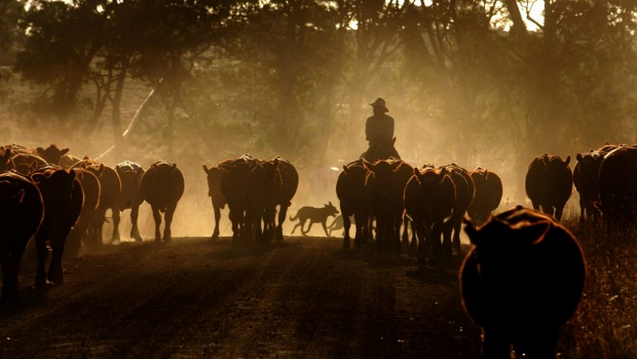A thumping majority of Australian farmers have concluded they are witnessing the effects of climate change, urging the Coalition government to reduce greenhouse gas emissions and prepare the country for a future that is drier, less predictable and more prone to bushfires.
This is according to a survey of 1300 primary producers across states and agricultural sectors, conducted by advocacy group Farmers for Climate Action with the co-operation of the National Farmers Federation.
Greenhouse gases: not just a bunch of hot air
From tracing the exact source of CO2 in our atmosphere to measuring the earth's "carbon budget," the scientists studying climate change know a lot more about the greenhouse effect than you might think.
From tracing the exact source of CO2 in our atmosphere to measuring the earth's "carbon budget," the scientists studying climate change know a lot more about the greenhouse effect than you might think.
Nine in 10 are concerned about damage to the climate and eight in 10 support Australia moving towards 100 per cent renewable energy.
A delegation of six farmers visited Parliament House on Monday and Tuesday to convey the findings, meeting with politicians of all persuasions to make their case for emissions reductions, global leadership and boosted research on new technology.
Derek Blomfield, a beef producer from the Liverpool Plains in Nationals leader Barnaby Joyce's New South Wales electorate, has observed increasing unreliability of weather.
He now finds managing his property more difficult and wants to see "strong leadership" from the Coalition government and thinks farmers shouldn't be scared of initiatives like emissions trading schemes and carbon taxes.
"For our industry, it's critical that we don't let this thing get out of hand. When I say for our industry, it actually means for everyone. Because we all need a farmer three times a day."
 |
| Victorian dairy farmer Karrinjeet Singh-Mahil and Liverpool Plains beef farmer Derek Blomfield at Parliament House in Canberra on Tuesday. Photo: Alex Ellinghausen |
The survey found changes to rainfall had been observed by 67 per cent of respondents, more frequent and worse droughts by 47 per cent, floods by 46 per cent, increased temperatures by 42 per cent, changing planting times by 41 per cent and more frequent and worse bushfires for 22.5 per cent.
 |
| Victorian cattleman Craig Porter takes his cattle for grazing on the roadside due to the 2007 drought. Photo: Justin McManus |
Karrinjeet Singh-Mahil, a dairy farmer from Crossley in Victoria, wants boosted climate change research funding and improved access to the Emissions Reductions Fund for farmers to pursue new initiatives.
 |
| Dried up vineyards near Menindee, NSW hit by drought in 2016. Photo: Edwina Pickles |
Ms Singh-Mahil said her property is suffering from increased erosion and pastures not surviving the season. She is satisfied with the reception from Canberra MPs, especially the understanding of those who have real experience on farms.
Climate change, which scientific consensus has found to be a unique threat driven by the human-generated increase in greenhouse gas emissions, gradually lifts air and ocean temperatures, making weather more unpredictable, raising sea levels and undermining critical environmental processes.
The average global temperature has already risen one degree celsius above pre-industrial levels and 2016 is set to knock off 2015 as the hottest year on record.
Links






